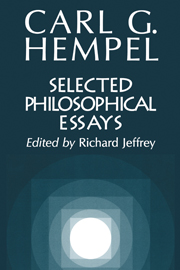Book contents
- Frontmatter
- Contents
- Preface
- Dates
- Introduction
- TRUTH
- PROBABILITY
- METHODOLOGY
- Chapter 9 The Logical Analysis of Psychology
- Chapter 10 Schlick and Neurath: Foundation vs. Coherence in Scientific Knowledge
- Chapter 11 On the Cognitive Status and the Rationale of Scientific Methodology
- Chapter 12 Provisoes: A Problem Concerning the Inferential Function of Scientific Theories
- MEMOIRS
- C. G. HEMPEL'S PUBLICATIONS
- Index
Chapter 10 - Schlick and Neurath: Foundation vs. Coherence in Scientific Knowledge
Published online by Cambridge University Press: 05 June 2012
- Frontmatter
- Contents
- Preface
- Dates
- Introduction
- TRUTH
- PROBABILITY
- METHODOLOGY
- Chapter 9 The Logical Analysis of Psychology
- Chapter 10 Schlick and Neurath: Foundation vs. Coherence in Scientific Knowledge
- Chapter 11 On the Cognitive Status and the Rationale of Scientific Methodology
- Chapter 12 Provisoes: A Problem Concerning the Inferential Function of Scientific Theories
- MEMOIRS
- C. G. HEMPEL'S PUBLICATIONS
- Index
Summary
INTRODUCTION
This symposium is dedicated to the ideas of Moritz Schlick and Otto Neurath. I am grateful for being able to count them among those thinkers who had an essential influence on my own philosophical development.
In the fall of 1929,I participated with great interest in Schlick's seminar and in his lecture on the philosophy of nature, and I heard the debates between him and Neurath in the lively meetings of the Vienna Circle. I visited lectures given by Neurath in Vienna and later in Berlin and Chicago, and I had many stimulating, sometimes exciting, discussions with him. I think of these very different thinkers, different in temperament and philosophical style, with deep respect and gratitude.
In my contribution to this symposium, I will not evoke personal memories; rather, I will investigate the opposing views that Schlick and Neurath held on one of the major problems of epistemology.
The problem I have in mind is the question under which conditions – or given which reasons – should we accept empirical statements, especially the statements of the empirical sciences. I will call Schlick's and Neurath's views foundational and coherentist, for short.
Both Schlick and Neurath were empiricists. In the brochure “The Scientific Conception of the World: The Vienna Circle,” which was published in honor of Moritz Schlick by Carnap, Hahn, and Neurath in 1929,2 the basic conviction of the group is said to be “empiricist and positivist: there is knowledge only from experience, which rests on what is immediately given. This sets the limit for the content of legitimate science.”
- Type
- Chapter
- Information
- Selected Philosophical Essays , pp. 181 - 198Publisher: Cambridge University PressPrint publication year: 2000
- 2
- Cited by



